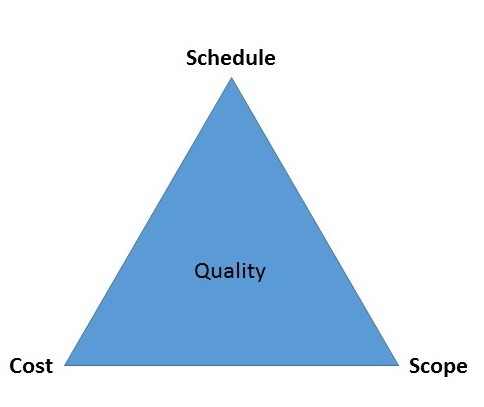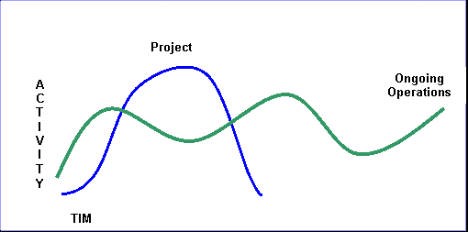What is a Project?
A project is a unique, transient endeavor, undertaken to achieve planned objectives, which could be defined in terms of outputs (Scope), outcomes or benefits (Quality). A project is usually deemed to be a success if it achieves the objectives according to their acceptance criteria, within an agreed timescale (schedule) and budget (cost).

Management vs Project Management
A key factor that distinguishes project management from just ‘management’ is that it has this final deliverable and a finite timespan, unlike management which is an ongoing process. Because of this a project professional needs a wide range of skills; often technical skills, and certainly people management skills and good business awareness.
Project vs Day-to-Day Operations
A project is:
“a temporary endeavor undertaken to create a unique product, service, or result.”
- Day to day operations, on the other hand, is work done in organizations to sustain the business.
- Projects are different from operations in that they end when their objectives have been reached or the project has been terminated.

The Project Management Institute’s PMBOK Guide provides the following differences between Project Management and Operations Management:
- Temporariness vs Permanence
- Definite Beginning and End vs Repetitive Cycle
- Scope, Time and Budget Constraints vs Supply Chain Constraints

Characteristics of Project
Projects come in all shapes and sizes. A project is a planned set of interrelated tasks to be executed over a fixed period and within certain cost and other limitations.The following characteristics help to further define a project:
- A project has a unique purpose. Every project should have a well-defined objective. For example, many people hire firms to design and build a new house, but each house, like each person, is unique.
- A project is temporary. A project has a definite beginning and a definite end. For a home construction project, owners usually have a date in mind when they’d like to move into their new home.
- A project drives change and enables value creation. A project is initiated to bring about a change in order to meet a need or desire. Its purpose is to achieve a specific objective which changes the context (a living situation, in this house project example) from a current state to a more desired or valued future state.
- A project is developed using progressive elaboration or in an iterative fashion. Projects are often defined broadly when they begin, and as time passes, the specific details of the project become clearer. For example, there are many decisions that must be made in planning and building a new house. It works best to draft preliminary plans for owners to approve before more detailed plans are developed.
- A project requires resources, often from various areas. Resources include people, hardware, software, or other assets.Many different types of people, skill sets, and resources are needed to build a home.
- A project should have a primary customer or sponsor. Most projects have many interested parties or stakeholders, but someone must take the primary role of sponsorship. The project sponsor usually provides the direction and funding for the project.
- A project involves uncertainty. Because every project is unique, it is sometimes difficult to define the project’s objectives clearly, estimate exactly how long it will take to complete, or determine how much it will cost. External factors also cause uncertainty, such as a supplier going out of business or a project team member needing unplanned time off. Uncertainty is one of the main reasons project management is so challenging, because uncertainty invokes risk.
— — — — — — — — — — — — — — — — — — — — — — — — — —
Automate Your Project Management Process
Thomas Carlyle, a famous historian and author, stated,
“Man is a tool-using animal. Without tools he is nothing, with tools he is all.”
As the world continues to become more complex, it is even more important for people to develop and use tools, especially for managing important projects. Automated project management tools and techniques assist project managers and their teams in carrying out work faster, better and easier.

